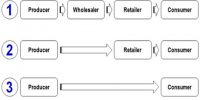Entrepreneur Contribution to GDP
Increase in the Gross Domestic Product or GDP is the most common definition of economic development. You are aware that income is generated in the process of production. So, entrepreneurs generate income via organisation of production be it agriculture, manufacturing or services.
Entrepreneurship makes a positive contribution to economic growth and development and vice versa, mainly through the process of structural transformation. The relationship between gross domestic product (GDP) and entrepreneurship is identified in three phases, representing three phases of development: (1) factor-driven economies; (2) efficiency-driven economies; and (3) innovation-driven economies.
You are also aware that income generated is distributed among the factors of production where land gets rent, labour gets wages and salaries, capital gets interest and the residual income accrues to the entrepreneur in the form of profits. Entrepreneurship is a prime catalyst for job creation, and there is evidence of a strong upward trend line between entrepreneurship and employment growth. Policy in promoting entrepreneurship must be mindful of both quantity and quality of entrepreneurship in its design. As rent and interest accrue to those few who have land and capital respectively whereas larger masses are destined to earn their incomes via wage employment, the biggest contribution of the entrepreneurship lies in capital formation and generation of employment. This is what we turn our attention to.














